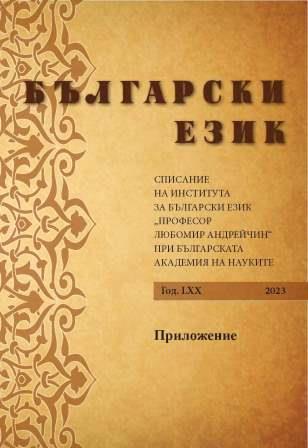Едносъставни глаголни изречения, безлични глаголи, предикативи и форми на изразяване на субективност в българския език
Subjectless Sentences, Impersonal Verbs, Predicatives and Subjectivity-expressing Forms in Bulgarian
Author(s): Maxim StamenovSubject(s): Language studies, Theoretical Linguistics, Applied Linguistics, Syntax, Philology
Published by: Институт за български език „Проф. Любомир Андрейчин“, Българска академия на науките
Keywords: subjectless sentences; impersonal verbs; predicatives; subjectivity; egocentricity; agreement between the main parts of the sentence; Bulgarian language
Summary/Abstract: One of the essential aspects of the concept of subjectivity proposed by Émile Benveniste (1966) is related to the idea that there are only two parts of speech in the language where the category of subjectivity is directly expressed in the category of grammatical person – these are (personal and possessive) pronouns and verbs. In sentences comprising a subject and a predicate, the person of the nominally or pronominally expressed subject must agree in person with the finite verb form (predicate). Taking this assumption as a point of departure, I consider the possibilities for realising the category of subjectivity in the cases where (pro)noun – verb person agreement is violated, as in the so-called subjectless sentences in Bulgarian.
Journal: Български език
- Issue Year: 70/2023
- Issue No: Special
- Page Range: 158-178
- Page Count: 21
- Language: Bulgarian

